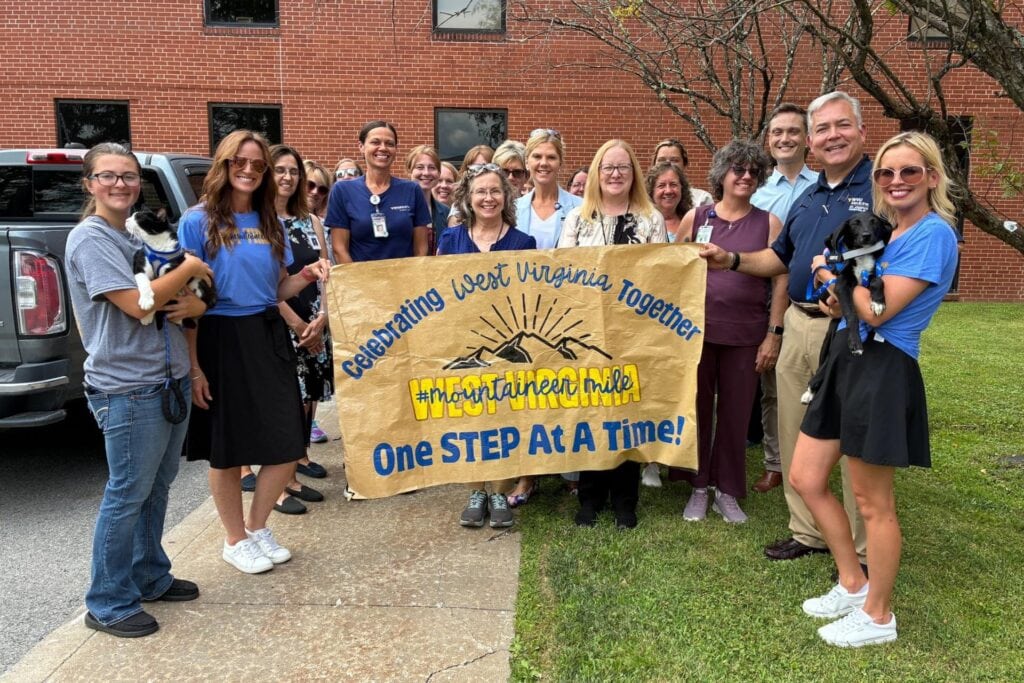Editor’s note: This story was originally published by Mountain State Spotlight. Get stories like this delivered to your email inbox once a week; sign up for the free newsletter at https://mountainstatespotlight.org/newsletter
By Douglas Soule, Mountain State Spotlight
KEYSTONE — Lori Bishop’s house sits halfway up one of the mountains surrounding downtown Keystone. From her vantage point sitting on her front porch, she can see most of the vacant, deteriorating buildings lining the town’s main drag.
“Every building you see empty was full,” Bishop said, pointing. “I shudder to think of all the vermin that’s living in there.”
Down along U.S. 52, one of those vermin, a raccoon, lounged in the front window display of a vacant store. Unperturbed by four wheelers and dirt bikes roaring past, the raccoon kept munching on a bit of white fabric clutched between its front paws.
On either side sat more vacant buildings. Across the road, a former hardware store. One building away was another former hardware store, the boards covering its windows chipped and peeling at the bottom. Everywhere there are reminders of the thousands of people who have left Keystone over the decades.
The current population: 176. The number of tax-paying businesses: two.
McDowell County towns like Keystone have been on the decline for decades. Here, the remaining residents aren’t sure what the future might hold. Some are looking to the already-stretched county government to step in. At the same time, county officials say they need more help from the state, or from the federal government. But whether the area’s trend of population loss and declining opportunities can be reversed at all is a matter of debate — and money.
“The city is to a point now, you’re at a standstill,” said Vondalere Scott, Keystone’s acting mayor. “You could go up but you ain’t got much to go up with.”
‘Used to be’
Hattie Avery and her sister Holly Maben remember Keystone as it was. After their father died in the mines, their mother moved them to the town using some of the money the coal company paid out after his death. Avery was six years old at the time, and Maben was an infant. It was the early 1950s, and Maben remembers Keystone as an exciting, bustling place to live.
“My girlfriends and I could walk to the drugstore and get comic books, walk and get ice cream, and we could walk to whatever we needed to do because it was in the vicinity,” Maben said.
At that point, Keystone held more than 2,000 people more than it does now. Businesses lined its main street. Coal was king, as the saying goes, and the local mines were humming. But technology and mechanization replaced many mining jobs, and demand shrunk for coal as cheaper forms of energy, like natural gas, became readily available.
Then, in 1999, the federal government closed down the National Bank of Keystone, a major employer in the area, amid scandal. Major flooding ravaged the land over the next few years, destroying businesses and homes that would never be replaced.
“We sat here on our porch and watched so much of our town just wash down the street,” Avery said.
That caused another kind of flood: of people moving to other places.
“Homes were literally washed away,” Avery said. “And those people were forced to just move, relocate. And most of those people never returned.”
Depopulated or not, the sisters both love the city. That’s why Avery ran for city councilor, winning alongside her sister, Maben, who’s going to be the town’s next recorder. They both hope to make Keystone a better place, but the two have very different views about what’s possible.
Maben can see it “growing and getting better.”
But Avery has reached the point where she thinks dissolving the city government might be the best way forward.
“I know that we can make it better, but I’m not certain that we can make it what we want it to be with just the few of us that we have and not having the support that we need,” Avery said. “As far as I can see now, I don’t see much of a future for Keystone.”
The city is limited in what services it can offer, and Avery wants to unincorporate so that the county or state could take over those services Keystone can’t currently fund.
“We don’t have any form of revenue or any form of businesses that could keep this city operational,” she said.
The decision to officially dissolve the city government — and end the few services like garbage pick up and part time law enforcement it provides — will ultimately lie with Keystone’s residents. First, the city would have to pay off the nearly $40,000 it owes in electric bills, according to city officials. Then, the measure would have to be voted on by residents.
Whatever Avery thinks of the future, she plans to fight for Keystone. And she said other levels of government should be fighting for it too.
“We were important for the state when coal was a booming industry,” she said. “But now, we don’t have anything to offer, so we’re on the backburner. Nobody notices. Nobody cares.”
While the county recently took over the town’s problematic water system, finally giving residents reliable water supply, a host of issues remain, from the snowy roads that remain unplowed all winter to the excess of dilapidated buildings.
“We just need government officials, county, state, all of them, to just try to send things our way,” Avery said. “We just need help.”
‘Surely forgotten’
But as Keystone officials look toward the county to provide more services, McDowell County officials are looking to the state and federal government for help, too.
“We just need help,” said McDowell County County Commission President Cecil Patterson. “We help, from giving our citizens up to fight wars, to mining coal, to paying severance tax, whatever was asked from us we’ve done.”
Commissioner Michael Brooks said the decline will be very tough to reverse.
“We try our best but I just feel like on the state and federal level they have surely forgotten the good people here in McDowell County,” he said.
Few areas have been affected worse by coal’s decline. McDowell County is one of the poorest places in the country, and its population, which almost surpassed 100,000 in 1950, now sits at about 19,000.
Patterson said if Keystone unincorporated, the county government is willing to help the residents.
“We’d like to keep them; we’ve lost enough in McDowell County, we can’t afford to lose anymore,” he said.
But if more cities follow suit or otherwise limit their services, that puts more strain on the county’s budget. State Auditor JB McCuskey recently said the county was in “poor financial standing,” behind on its regional jail bills by more than a million dollars.
The county is losing $100,000 or more from its budget every year, Patterson said.
And additional expenses, like picking up services that cities like Keystone currently provide, will in turn limit the money McDowell County can put toward trying to reverse the current area decline. Patterson said the county needs new jobs and new housing options, to start.
“If we don’t keep this younger population and have something for them to do, the county is going to look devastated in 20 years,” he said. “It puts the stakes high on us.”
Brooks said the county could use a lot more money to remove the dilapidated buildings that were left behind following the decades of exodus. More resources are also needed for broadband, flood mitigation, roads and water system upgrades, he said. He also believes state and federal resources could help them prepare sites for home or economic development opportunities.
And this could be the right time for it, as the state is flush with federal money from the infrastructure bill, the American Rescue Plan and other federal coronavirus relief.
While Brooks hopes enough of that comes McDowell County’s way to begin to address the county’s problems, he said,“I’m optimistic but my hope’s really ain’t that high.”
Sen. Chandler Swope, whose district includes much of McDowell County, said while the county is not getting the amount of resources it needs, a lot of money the state gives out is based on population.
“They aren’t discriminated against in an unfair manner, I don’t think,” he said. “The county does] need a lot more to reverse [the trend], but there isn’t a lot more available to reverse it.”
The horizon
There are some bright spots on the horizon: the Coalfields Expressway, which would connect Beckley with the county seat of Welch, though that is not slated to be complete for several years. There’s also the King Coal Highway, which is planned to link McDowell, Mercer, Mingo, Wyoming and Wayne counties.
Another piece of the puzzle could be the all-terrain vehicle industry, which draws many thousands of people annually. Patterson said the county needs to fix its infrastructure and improve lodging and entertainment options, so ATV riders actually stay where they ride.
“We’ve got to keep them here so they don’t just come here, ride their four-wheelers, pack up and leave,” he said. “We want them to stay here, sleep here, eat here.”
Lance Rashford, sitting on his four-wheeler in the parking lot of Keystone’s gas station, said more options would be nice. He came all the way from New Jersey to ride McDowell County’s trails.
He said the trails were amazing and marked well, but felt like businesses were “limited for how big the area is.”
Meanwhile, every day Lori Bishop watches that same gas station parking lot ebb and flow with ATV riders. From her perspective, the surge of tourists hasn’t contributed any new business to the city. Rather, they’ve primarily contributed noise.
“I don’t see where the town has benefited,” Bishop said. “Most of these buildings are completely empty, and it’s expensive to tear a building down.”
But Bishop is staying in Keystone. So is Vondalere Scott, the acting mayor.
“We got a house that’s paid for. Why go somewhere else and start over?” Scott said, chuckling.
“It’s just a friendly town,” she said. “Everybody that comes here says the people are friendly.”
And there’s Maben, who spent decades elsewhere before moving home.
“I love Keystone; I love McDowell County,” she said. “I want to see Keystone at its best, and I don’t want it to be changed any more than it has to be. I want it to be a vibrant, running town.”
Reach reporter Douglas Soule at douglassoule@mountainstatespotlight.org.













